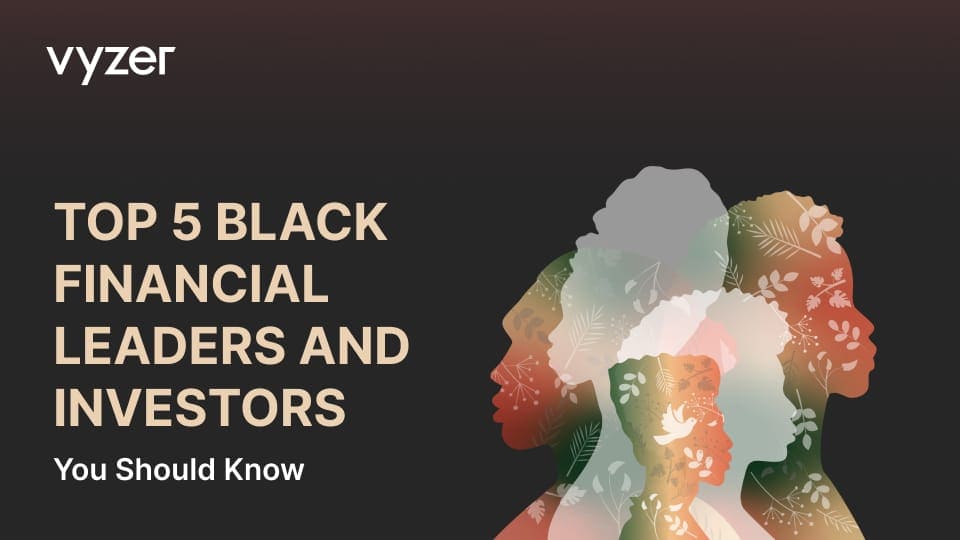
February is Black History Month, and we wanted to shine a light on past and present Black leaders in the world of finance. While there are many Black leaders in different fields of finance, we chose these five because of their unique contributions, impact, and their outstanding potential.
Historically, Black people were often kept out of the conversation when it came to finances and building wealth. In more recent years, that conversation has started to shift and become more inclusive, but it didn’t happen on its own. Thanks to the work of strong leaders like those on this list, Black financial leaders were able to claim their space in financial spheres and help contribute to their own communities to create real, long-lasting change.
Lauren Simmons has built a name for herself as a financial analyst and businesswoman. She’s widely known as the youngest and only full-time female trader on the floor of the New York Stock Exchange (NYSE). Simmons began her career at the NYSE as a runner, and through hard work and determination, worked her way up to become a trader.
Aside from her work in the NYSE, Simmons is also an author, producer, podcast host, and motivational speaker. She consistently advocates for women and minorities in the industry as well as diversity and inclusion in the workplace. She has been featured in various media outlets such as Forbes and CNN, where she has shared stories of her career and encouraged others to pursue their dreams. Simmons is dedicated to making a positive impact in the industry and is a role model for young people, especially women and minorities, who are underrepresented in the finance industry.
Though he came from humble beginnings, Travers J. Bell, Jr. earned degrees from Washington University in St. Louis and the New York Institute of Finance, a significant achievement for a Black person at that time. His career began as a messenger at Dempsey-Tegeler & Company, but he quickly rose through the ranks to become vice president. In 1971, he co-founded Daniels & Bell, the first Black-owned investment firm on the NYSE with only $175,000 in capital, and grew the firm’s value to $15 million through a series of successful investment decisions.
Throughout his lifetime, Bell made it his mission to give back to the community by specializing in underwriting securities for minority-owned businesses and municipal bonds for small Southern towns, often overlooked by other investors. By backing firms, individuals, and towns that had been overlooked by Wall Street, Bell found a successful market while also spurring development in previously poor and underserved parts of the country.
Bell passed away in 1988 at the age of 46 from a heart attack, though his legacy lives on through his son Gregory S. Bell, a well-known writer at Black Enterprise and author of “In the Black: A History of African Americans on Wall Street.”
Robert F. Smith is a successful businessman, philanthropist, and founder, chairman, and CEO of Vista Equity Partners, a leading private equity firm with over $50 billion in managed assets. Smith began his career in investment banking at Goldman Sachs, where he worked on some of the most significant transactions in the technology industry. He then went on to co-found Vista Equity Partners in 2000, which has since become one of the most successful private equity firms in the world.
Smith is known for his leadership and business acumen and has been recognized for his contributions to the technology industry, including being named to Forbes’ list of the world’s billionaires and Ebony Magazine’s Power 100 list. He’s also a committed philanthropist and advocates for education, particularly for underprivileged children. In 2019, he made headlines for his generous act of paying off the student loans of the Morehouse College graduating class, a total of $34 million.
Daymond John is a successful entrepreneur, television personality, and author. He’s best known as the founder and CEO of FUBU, a fashion brand that rose to popularity in the 90s. John started FUBU as a small home-based business and eventually turned it into a global brand with over $6 billion in sales.
John is also known for his appearances on the hit television show Shark Tank, where he invested in numerous successful companies. He has also written several books, including “The Power of Broke,” which is based on his own experiences as an entrepreneur, and “Rise and Grind,” which provides advice and inspiration for achieving success.
John is also actively involved in philanthropy and has been recognized for his contributions to various charitable causes. He’s a founding member of the Entrepreneurship Collective, a non-profit organization that provides mentorship and resources to entrepreneurs in underprivileged communities.
Calvin Williams, Jr. created Freeman Capital, the only Black-owned SEC-registered automated wealth management platform. Through Freeman Capital, Williams aims to help close the wealth gap and improve the quality of life for underserved communities. He was recruited by the Department of Defense at age 17 to work on top-secret projects while in college and is a graduate of North Carolina Agricultural and Technical State University where he was student body president.
Williams was motivated to start Freeman Capital after being unable to find an advisor to help him manage his finances after college because he didn’t already have wealth to bring with him to his investments. Freeman Capital’s aim is to make investing more accessible and comfortable for the Black community. The company was awarded the title of “Startup of the Year” in 2020 in a national competition for Black-led companies. In 2021, Investment News named Williams in their top 40 under 40 industry leaders to watch.
Learning more about Black entrepreneurs, investors, and leaders is a good way to honor Black History Month. It helps different communities understand the struggles of minorities in different contexts, and allows us to appreciate the strength and determination necessary for Black leaders to carve out a name for themselves while still working to support their communities.